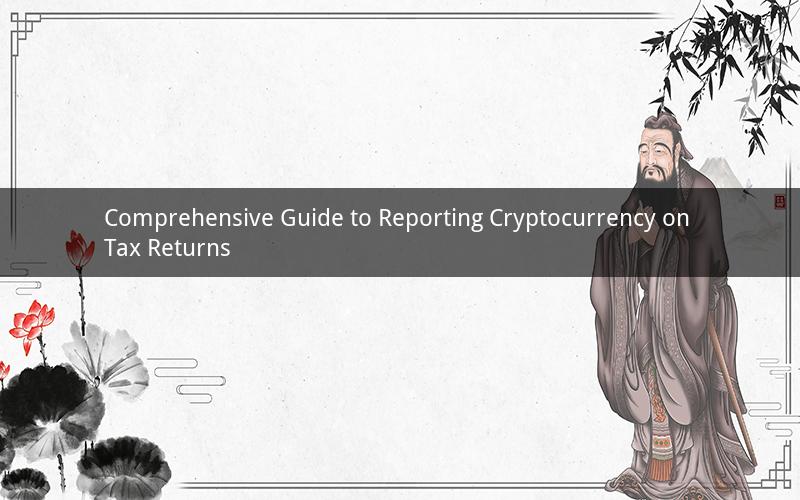
Introduction:
Cryptocurrency has become an increasingly popular investment and asset class in recent years. As the tax season approaches, many individuals are wondering whether they need to report their cryptocurrency on their tax returns. This article aims to provide a comprehensive guide on reporting cryptocurrency on tax returns, including the reasons for reporting, the process, and potential consequences.
1. Why Should I Report Cryptocurrency on My Tax Returns?
Reporting cryptocurrency on your tax returns is important for several reasons:
a. Legal Requirement: In many countries, including the United States, the reporting of cryptocurrency is a legal requirement. Failure to report can result in penalties and interest charges.
b. Accurate Financial Record: Reporting cryptocurrency ensures that you have an accurate record of your financial transactions, which can be helpful for future reference and decision-making.
c. Avoiding Penalties: By reporting cryptocurrency, you can avoid potential penalties and interest charges that may arise from failing to comply with tax regulations.
2. How Do I Report Cryptocurrency on My Tax Returns?
Reporting cryptocurrency on your tax returns can be done in several steps:
a. Determine the Cost Basis: The cost basis of your cryptocurrency is the amount you paid for it, including any transaction fees. This information is crucial for calculating gains or losses.
b. Calculate Gains or Losses: Subtract the cost basis from the current value of your cryptocurrency to determine the gain or loss. If the result is positive, it represents a capital gain; if it's negative, it represents a capital loss.
c. Report the Gains or Losses: Include the gains or losses from your cryptocurrency transactions on Schedule D of your tax return. If you have multiple transactions, you may need to complete multiple lines on Schedule D.
d. Pay Taxes on Gains: If you have capital gains from your cryptocurrency, you will need to pay taxes on those gains. The tax rate depends on your overall income and the holding period of the cryptocurrency.
3. What Are the Potential Consequences of Not Reporting Cryptocurrency?
Failing to report cryptocurrency on your tax returns can lead to several consequences:
a. Penalties and Interest Charges: The IRS can impose penalties and interest charges on late or inaccurate tax returns. The penalties can be as high as 25% of the unpaid tax.
b. Audits and Investigations: The IRS may initiate an audit or investigation if they suspect that you have failed to report cryptocurrency. This process can be time-consuming and stressful.
c. Criminal Charges: In some cases, failing to report cryptocurrency can lead to criminal charges, including fraud and tax evasion. These charges can result in fines and imprisonment.
4. Are There Any Exceptions to Reporting Cryptocurrency?
While reporting cryptocurrency is generally a legal requirement, there are some exceptions:
a. Small Amounts: Some countries, including the United States, allow individuals to exclude small amounts of cryptocurrency from their tax returns. The threshold for this exclusion may vary depending on the country.
b. Gifts and Inheritances: If you received cryptocurrency as a gift or inheritance, you may not be required to report it on your tax return. However, you must still keep accurate records of the transaction.
5. Frequently Asked Questions
Q1: Do I need to report cryptocurrency I received as a gift?
A1: Generally, no. If you received cryptocurrency as a gift, you may not be required to report it on your tax return. However, you should keep accurate records of the transaction.
Q2: Can I deduct losses from cryptocurrency on my tax return?
A2: Yes, you can deduct losses from cryptocurrency on your tax return. However, the IRS may limit the amount of capital losses you can deduct.
Q3: Do I need to report cryptocurrency I received as payment for goods or services?
A3: Yes, you must report cryptocurrency received as payment for goods or services. The cost basis for this cryptocurrency is the fair market value at the time of the transaction.
Q4: Can I report cryptocurrency on my state tax return?
A4: Yes, many states require individuals to report cryptocurrency on their state tax returns. The specific requirements may vary by state.
Q5: What should I do if I haven't reported cryptocurrency on my previous tax returns?
A5: If you haven't reported cryptocurrency on your previous tax returns, you should consult a tax professional to determine the best course of action. This may involve amending previous tax returns and paying any back taxes, penalties, and interest charges.
Conclusion:
Reporting cryptocurrency on your tax returns is a crucial step to ensure compliance with legal requirements and maintain accurate financial records. By following the steps outlined in this guide, you can avoid potential penalties and consequences. Always consult a tax professional if you have any questions or concerns regarding your cryptocurrency transactions.